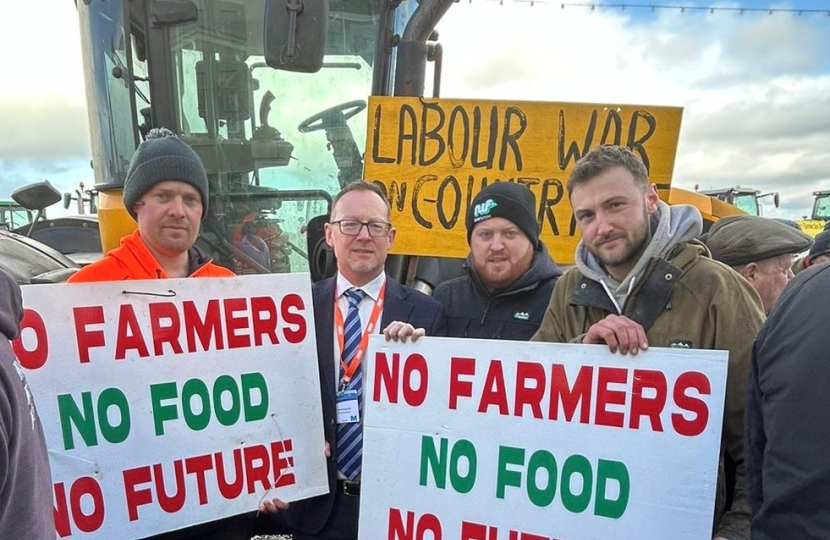Updated January 2025
Supporting Farmers and Rural Life.
2024 saw large protests in both London and Cardiff. In February, thousands of farmers and people who live across rural Wales voiced their concerns about the Welsh Government’s Sustainable Farming Scheme. In November, tens of thousands of farmers from across the UK descended on London to air their views about changes to the Agricultural Property Relief (APR) and Business Property Relief (BPR) which will see many farmers subject to paying inheritance tax on their family farms, potentially eroding our farms away.
The industry is at breaking point, with farmers being asked to do more for less, with reduced support and increasing environmental demands. My view is that the UK Government’s inheritance tax changes will lead to the breakup of family farms. Many families will simply have to sell off parts of their farm, making the business less viable.
I took part in a Welsh Conservatives debate in November, where I spoke in favour of a Welsh Conservative Senedd motion calling for the tax to be scrapped. The Welsh Government Ministers voted against our motion.
Rural economies depend on the farming industry. The consequences of family farms dwindling away is that we will become more reliant on food supplied from outside of the UK.
The above matters are of course matters for the UK Government, but I also move onto areas that fall within the responsibility of the Welsh Government.
Whilst there did not seem to be a desire from the Welsh Government to make changes to their sustainable faming scheme, the Basic Payment Scheme was extended into 2025, with the SFS transition delayed to 2026. Due to pressure from farmers, unions, and politicians lobbying for change, in the later part of 2024, the Welsh Government announced they would replace a 10% tree cover requirement with a "tree planting and hedgerow creation plan" by 2030, and shift some requirements like pond management to an optional layer. However, farmers are still asked to manage 10% of their land as habitat.
Many key decisions, including payment rates, remain unresolved, leaving farmers in limbo. An updated economic analysis is expected in the summer (2025), but my view is that farmers need clarity now to plan for the future.
The Welsh Government also needs to do so much more to tackle the devastation that bovine TB causes. I believe that a holistic approach to defeating the disease is required; working in partnership with farmers and vets to eradicate the reservoir of infection within herds, eliminate inter-herd transmission and the targeted removal of infected wildlife, who themselves suffer a painful death due to TB.
The Rural Affairs Cabinet Secretary, Huw Irranca-Davies MS also set up a Technical Advisory Group (TAG) on TB, which was welcome. One change recommended by the TAG means that farmers will be able to choose to delay the removal of a cow or heifer in the last 60 days of pregnancy and animals that have given birth in the previous 7 days, subject to biosecurity conditions to protect other cattle in the herd. There is a lot more work to do if we are to catch up with the progress made in the fight against TB over the border in England where the removal of infected wildlife takes place. As Welsh Conservatives we have lobbied the Welsh Government to end the dreadful on-farm slaughter policy. I am pleased the Welsh Government have moved on this matter.
Another growing area of concern in recent years has been the increasing pressure on farming businesses from government regulation. The farming industry have been looking after our countryside for centuries, but the burden of further unnecessary regulation, and again a one-size-fits-all approach, is why I and Welsh Conservatives, voted against The Water Resources (Control of Agricultural Pollution) (Wales) Regulations (NVZs). The additional burden in Wales also makes famers less competitive than farming businesses often just a few miles away over the border.
Following a survey carried out during 2024 with farming businesses, I fed in to and worked with my Welsh Conservative colleagues, on our own proposals as an alternative to the SFS. We announced several key areas that we intended to focus on. Our proposals are designed to be an alternative to the current SFS, which I hope addresses issues raised with me and the specific challenges faced by Welsh farmers.
I am pleased that the farming sector has the support of the public, many of whom are not linked to the industry. This support needs to be maintained, it is incumbent on both the farming sector and politicians like me who fully support the industries calls, to set out why we need to back our farmers.

